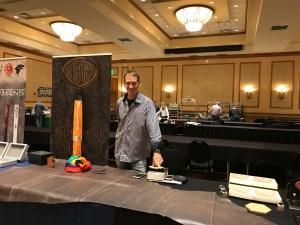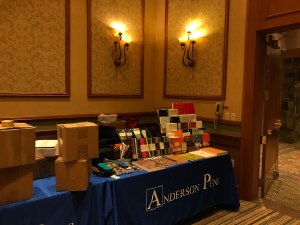by Ruth Feiertag
23 April 2018

Dear Readers,
Today marks the 454th anniversary of Shakespeare’s birthday and the 402nd anniversary of his death. To mark the day, I offer here a few of my favourite bits and pieces from the oeuvre of the Man from Stratford, fragments that remind us how much we can learn from someone who lived and wrote over four hundred years ago.
Issues of friendship (usually complicated) pervade Shakespeare’s work. Hermia and Helena; Hamlet and Horatio; Rosalind and Celia; the Prince, Claudio, and Benedick; Beatrice and Hero; Antony and Enobarbus; Hal and Falstaff; Paulina and Hermione (not Granger) — these friendships have trials and separations, misunderstandings serious and silly, but throughout his plays and poems, Shakespeare recognizes that friendship is essential to humanity. Sonnet 29 describes the way a steady and loyal friend can save us from the depths of despair and self-loathing. (Jaynie: this one’s for you.)
Sonnet XXIX
When, in disgrace with fortune and men’s eyes,
I all alone beweep my outcast state
And trouble deaf heaven with my bootless cries
And look upon myself and curse my fate,
Wishing me like to one more rich in hope,
Featured like him, like him with friends possess’d,
Desiring this man’s art and that man’s scope,
With what I most enjoy contented least;
Yet in these thoughts myself almost despising,
Haply I think on thee, and then my state,
Like to the lark at break of day arising
From sullen earth, sings hymns at heaven’s gate;
For thy sweet love remember’d such wealth brings
That then I scorn to change my state with kings.
While sometimes we need to look to others for support or inspiration, Shakespeare also urges us to examine ourselves to find what qualities lie within that we can, that we mustshare with others. Our awareness of how we depend on others becomes balanced by the realization of what we owe the world:
Thyself and thy belongings
Are not thine own so proper as to waste
Thyself upon thy virtues, they on thee.
Heaven doth with us as we with torches do,
Not light them for themselves; for if our virtues
Did not go forth of us, ‘twere all alike
As if we had them not.
— William Shakespeare, Measure For Measure I.i.29-35
Of course, it’s all fun and games until somebody is looking to be the next king of England. In Henry IV, Part 1, Hal contemplates how his companions use him and how he intends to use them in turn to solidify his claim to the throne that his father usurped (though I will say, I think with good reason) from Henry’s cousin Richard.
I know you all, and will awhile uphold
The unyoked humour of your idleness:
Yet herein will I imitate the sun,
Who doth permit the base contagious clouds
To smother up his beauty from the world,
That, when he please again to be himself,
Being wanted, he may be more wonder’d at,
By breaking through the foul and ugly mists
Of vapours that did seem to strangle him.
If all the year were playing holidays,
To sport would be as tedious as to work;
But when they seldom come, they wish’d for come,
And nothing pleaseth but rare accidents.
So, when this loose behavior I throw off
And pay the debt I never promised,
By how much better than my word I am,
By so much shall I falsify men’s hopes;
And like bright metal on a sullen ground,
My reformation, glittering o’er my fault,
Shall show more goodly and attract more eyes
Than that which hath no foil to set it off.
I’ll so offend, to make offence a skill;
Redeeming time when men think least I will.
Henry IV, I. ii
 We could pause here to debate whether Hal is a clever politician or a rotten blackguard, if his companions deserve such a reversal, whether Hal is reluctant to do what he knows must be done or gleefully anticipating pulling the rug out from under Poins, Bardo, and especially Falstaff (“No, my good lord; banish Peto, banish Bardolph, banish Poins: but for sweet Jack Falstaff, kind Jack Falstaff, true Jack Falstaff, valiant Jack Falstaff, and therefore more valiant, being, as he is, old Jack Falstaff, banish not him thy Harry’s company, banish not him thy Harry’s company: banish plump Jack, and banish all the world”), but if anyone wants to have that discussion, let’s save it for the comments.
We could pause here to debate whether Hal is a clever politician or a rotten blackguard, if his companions deserve such a reversal, whether Hal is reluctant to do what he knows must be done or gleefully anticipating pulling the rug out from under Poins, Bardo, and especially Falstaff (“No, my good lord; banish Peto, banish Bardolph, banish Poins: but for sweet Jack Falstaff, kind Jack Falstaff, true Jack Falstaff, valiant Jack Falstaff, and therefore more valiant, being, as he is, old Jack Falstaff, banish not him thy Harry’s company, banish not him thy Harry’s company: banish plump Jack, and banish all the world”), but if anyone wants to have that discussion, let’s save it for the comments.
Back to the sonnets for a finish. In the thirty-third fourteener (that’s for any mountain climbers who might be reading), Shakespeare employs much of the same imagery he put into the mouth of Hal. The imagery works differently in the sonnet. We could, I suppose, maintain that 33 makes an argument for the benefits of recycling, but besides that important lesson, this poem also provides us with a thought-paradigm that can lead us to being forgiving of others and maybe even of ourselves.
Sonnet XXXIII
Full many a glorious morning have I seen
Flatter the mountain-tops with sovereign eye,
Kissing with golden face the meadows green,
Gilding pale streams with heavenly alchemy;
Anon permit the basest clouds to ride
With ugly rack on his celestial face,
And from the forlorn world his visage hide,
Stealing unseen to west with this disgrace:
Even so my sun one early morn did shine
With all triumphant splendor on my brow;
But out, alack! he was but one hour mine;
The region cloud hath mask’d him from me now.
Yet him for this my love no whit disdaineth;
Suns of the world may stain when heaven’s sun staineth.
None of us is perfect, but all of us are connected. Shakespeare lived a long time ago, but his works remain to make us think, to question, to push ourselves to become better people with broader minds and more expansive souls.
Happy birthday, Bill, and may flights of angels sing thee to thy rest.

P.S. Because Shakespeare and Cervantes share a death-day, here’s a sonnet from Don Quixote, one that touches on many of the same themes as the passages above:
When heavenward, holy Friendship, thou didst go
Soaring to seek thy home beyond the sky,
And take thy seat among the saints on high,
It was thy will to leave on earth below
Thy semblance, and upon it to bestow
Thy veil, wherewith at times hypocrisy,
Parading in thy shape, deceives the eye,
And makes its vileness bright as virtue show.
Friendship, return to us, or force the cheat
That wears it now, thy livery to restore,
By aid whereof sincerity is slain.
If thou wilt not unmask thy counterfeit,
This earth will be the prey of strife once more,
As when primaeval discord held its reign.
 Ruth Feiertag is the senior editor of Regal House Publishing. She holds a B.A. from the University of California Santa Cruz and an M.A. from the University of Colorado at Boulder. She finds Medieval and Renaissance literature (mostly poetry and drama) endlessly fascinating, and anyone who wants to be treated to a long monologue should ask her about bastards from the Middle Ages through the Early Modern period. Ruth is the founding editor of PenKnife Editorial Services, and a member of the National Coalition of Independent Scholars.
Ruth Feiertag is the senior editor of Regal House Publishing. She holds a B.A. from the University of California Santa Cruz and an M.A. from the University of Colorado at Boulder. She finds Medieval and Renaissance literature (mostly poetry and drama) endlessly fascinating, and anyone who wants to be treated to a long monologue should ask her about bastards from the Middle Ages through the Early Modern period. Ruth is the founding editor of PenKnife Editorial Services, and a member of the National Coalition of Independent Scholars.






















 I arrived last night, and even though the show was just starting to get set up, I saw some lovely people and got a peek at some tantalizing journals, papers, and pens. Cary Yeager from Fountain Pen Day gave me an official FPD pin and bookmark (I’m already collecting swag!) and we had a nice chat about the generosity of the fountain pen community. And it’s true: I have never met a group so welcoming and willing to share knowledge (and ink and pens) with even the newest of newbies.
I arrived last night, and even though the show was just starting to get set up, I saw some lovely people and got a peek at some tantalizing journals, papers, and pens. Cary Yeager from Fountain Pen Day gave me an official FPD pin and bookmark (I’m already collecting swag!) and we had a nice chat about the generosity of the fountain pen community. And it’s true: I have never met a group so welcoming and willing to share knowledge (and ink and pens) with even the newest of newbies.
 I began my bookstore safari in Seattle, Washington, where I was visiting my particular friend Maren Donley. Before I arrived, I explained my quest to her, and she immediately recommended a visit to the Third Place Books. While there are three Third Places (I’m not sure how the math works on that, whether it requires simple addition or some kind of quantum exponential multiplication), Maren suggested we drop by the Lake Forest store. “I drive by it twice a week. I had never been in until I met my priest there for a meeting. Then I said, ‘Oh! I have really been missing out!'” she told me.
I began my bookstore safari in Seattle, Washington, where I was visiting my particular friend Maren Donley. Before I arrived, I explained my quest to her, and she immediately recommended a visit to the Third Place Books. While there are three Third Places (I’m not sure how the math works on that, whether it requires simple addition or some kind of quantum exponential multiplication), Maren suggested we drop by the Lake Forest store. “I drive by it twice a week. I had never been in until I met my priest there for a meeting. Then I said, ‘Oh! I have really been missing out!'” she told me.

 The selection of books, Mr. Sindelar told me, has a curatorial aspect. The staff have a lot of say in the choices, which are also guided by the interests of customers and the diverse ideas and opinions that represent the neighborhood. It seems that every aspect of Third Place is indeed geared toward fostering community and neighborhood. The Commons area not only has ample seating and a play area for small children, it has three restaurants as well: sustenance for both mind and body.
The selection of books, Mr. Sindelar told me, has a curatorial aspect. The staff have a lot of say in the choices, which are also guided by the interests of customers and the diverse ideas and opinions that represent the neighborhood. It seems that every aspect of Third Place is indeed geared toward fostering community and neighborhood. The Commons area not only has ample seating and a play area for small children, it has three restaurants as well: sustenance for both mind and body. As we wended our way toward the registers at the front of the store, Maren pointed out the cards that annotated the books on the tables and shelves. The cards offered reviews by the staff, noted awards won by the book and author, and even let browsers know that a less expensive edition of the book in question was available on a different shelf in the store. I had seen cards similarly deployed in other stores, but never to such good effect. Walking through the store while looking at the books and reading the cards was like enjoying a stimulating conversation with friends or taking part in a silent book club discussion.
As we wended our way toward the registers at the front of the store, Maren pointed out the cards that annotated the books on the tables and shelves. The cards offered reviews by the staff, noted awards won by the book and author, and even let browsers know that a less expensive edition of the book in question was available on a different shelf in the store. I had seen cards similarly deployed in other stores, but never to such good effect. Walking through the store while looking at the books and reading the cards was like enjoying a stimulating conversation with friends or taking part in a silent book club discussion.


 Regal is a marvelous House, founded as it is on Jaynie’s passion for involving literature and her devotion to the authors who write it. When Jaynie asked me to help her lay bricks as the Senior Editor, I was—and still am—over the moon (don’t worry; there’s Internet here and manuscripts reach me even through the sublunary atmosphere). Jaynie and I share a desire—one that drives many independent publishers—to return to a publishing ethos in which authors are treated with courtesy and respect and their works are edited conscientiously and with great care. We meld traditional, intense, editorial engagement with the technology that enables small presses to publish noteworthy literature that might otherwise languish undiscovered and unread.
Regal is a marvelous House, founded as it is on Jaynie’s passion for involving literature and her devotion to the authors who write it. When Jaynie asked me to help her lay bricks as the Senior Editor, I was—and still am—over the moon (don’t worry; there’s Internet here and manuscripts reach me even through the sublunary atmosphere). Jaynie and I share a desire—one that drives many independent publishers—to return to a publishing ethos in which authors are treated with courtesy and respect and their works are edited conscientiously and with great care. We meld traditional, intense, editorial engagement with the technology that enables small presses to publish noteworthy literature that might otherwise languish undiscovered and unread.

